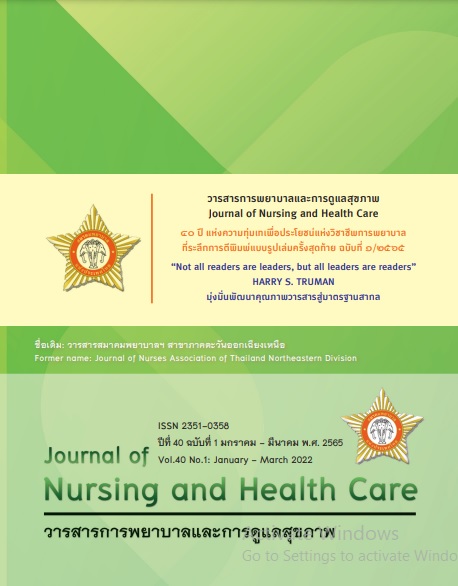คุณภาพแบบประเมินความรู้ ทัศนคติและพฤติกรรมการมีส่วนร่วมในการเลี้ยงลูกด้วยนมแม่เพียงอย่างเดียว 6 เดือนของสามี: ฉบับภาษาไทย
คำสำคัญ:
การเลี้ยงลูกด้วยนมแม่เพียงอย่างเดียว 6 เดือน สามี ความรู้ ทัศนคติ พฤติกรรมการมีส่วนร่วม กระบวนการแปลเครื่องมือบทคัดย่อ
การศึกษานี้เป็นการวิจัยแบบเชิงพรรณนาภาคตัดขวาง มีวัตถุประสงค์เพื่อพัฒนาและตรวจสอบคุณภาพของแบบประเมินความรู้ ทัศนคติ และพฤติกรรมการมีส่วนร่วมในการเลี้ยงลูกด้วยนมแม่เพียงอย่างเดียว 6 เดือนของสามี ฉบับแปลภาษาไทย โดยแปลจากแบบประเมินความรู้ ทัศนคติ และพฤติกรรมการมีส่วนร่วมในการเลี้ยงลูกด้วยนมแม่เพียงอย่างเดียว 6 เดือนของสามี ฉบับภาษาอังกฤษของ Bich ซึ่งมี 3 ชุด สำหรับการวัดความรู้ ทัศนคติ และพฤติกรรม การวิจัยมี 2 ขั้นตอน ได้แก่ ขั้นตอนการพัฒนาแบบประเมิน และ ขั้นตอนการทดสอบคุณภาพของเครื่องมือ ผู้วิจัยใช้กระบวนการแปลแบบย้อนกลับ แล้วนำมาทดสอบความเที่ยงกับกลุ่มตัวอย่างที่เป็นผู้ใช้ภาษาไทยภาษาเดียว และเป็นสามีของหญิงหลังคลอดที่โรงพยาบาลศรีนรินทร์ หรือโรงพยาบาลขอนแก่น จำนวน 30 คน ณ ระหว่างเดือนกันยายน - ตุลาคม 2563 ผลการศึกษา พบว่า แบบประเมินภาษาไทยทั้ง 3 ฉบับ มีเนื้อหาและความหมายเท่าเทียมกับแบบประเมินต้นฉบับภาษาอังกฤษ มีคะแนนเฉลี่ยความเท่าเทียมกันทางด้านความหมาย เท่ากับ 1- 2 คะแนน ค่าสัมประสิทธิ์แอลฟาของครอนบากของแบบประเมินความรู้ ทัศนคติและพฤติกรรมการมีส่วนร่วมในการเลี้ยงลูกด้วยนมแม่เพียงอย่างเดียว 6 เดือนของสามี ฉบับภาษาไทย เท่ากับ .815, .882 และ .939 ตามลำดับ ผลการศึกษาเสนอแนะว่า แบบประเมินฉบับแปลภาษาไทย นี้มีความเหมาะสมในการนำไปประเมินระดับความรู้ ทัศนคติและพฤติกรรมการมีส่วนร่วมในการเลี้ยงลูกด้วยนมแม่เพียงอย่างเดียว 6 เดือนของสามีได้
Downloads
เอกสารอ้างอิง
World Health Organization. Exclusive breastfeeding [Internet]. 2017 [cited 2019 Nov 28]. Available from: http://www.who.int/maternal_child_adoles-cent/topics/newborn/nutrition/breastfeeding/en/
World Health Organization. Infant exclusively breastfeeding for the first six months of life (%) [Internet]. 2021 [cited 2021 Oct 8]. Available from: https://www.who.int/data/gho/data/indicators/ indicator-details/GHO/infants-exclusively-breast¬fed-for-the-first-six-months-of-life-(-)
Thailand UNICEF. Breastfeeding in COVID pendemic period. [Internet]. 2022 [cited 2022 Mar 15]. Available from: https://www.unicef.org/ thailand/th/
Apartsakun P. Value of breastfeeding in Thai mothers: Nursing roles. Journal of The Royal Thai Army Nurses 2018; 19(Supp): 53-61.
Jama A, Gebreyesus H, Wubayehu T, Gebregyorgis T, Teweldemedhin M, Berhe T, et al. Exclusive breastfeeding for the first six months of life and its associated factors among children age 6-24 months in Burao district, Somaliland. Int Breastfeed J 2020; 15(1): 1-8.
Merida Y, Ernawati D, Mufdlilah. Husband support on working mothers in giving exclusive breastfeeding. Adv Heal Sci Res 2020; 24: 206-10.
Thepha T, Marais D, Bell J, Muangpin S. Perceptions of northeast Thai breastfeeding mothers regarding facilitators and barriers to six-month exclusive breastfeeding: Focus group discussions. Int Breastfeed J 2018; 13(1): 1-10.
Ouyang YQ, Nasrin L. Father’s knowledge, attitude and support to mother’s exclusive breastfeeding practices in Bangladesh: A multi-group structural equations model analysis. Healthc 2021; 9(3): 1-23.
Kaewjanta N RS. Working-age northeastern Thai males’ perception of causes of depression. Thai J Nurs Counc 2020; 35(4): 18-34 .
Wang R, Yang Y, Chen R, Kan H, Wu J, Wang K, et al. Knowledge, attitudes, and practices (KAP) of the relationship between air pollution and children’s respiratory health in Shanghai, China. Int J Environ Res Public Health 2015; 12(2): 1834-48.
Bich T. Changes in paternal knowledge, attitudes and practice in supporting the first 6 months’ exclusive breastfeeding: results of a community-based intervention applied social cognitive theory. J Heal Dev Stud. 2017; 1(2):19-28.
Srisatisnarakul B. The translation process of research instrument and quality appraisal. J Res Curric Dev. 2014; 4(2):49-61.
Phongphanngam S, Lach HW. Cross-cultural instrument translation and adaptation: challenges and strategies. Pacific Rim Int J Nurs Res 2019; 23(2): 170-80.
Maneesriwongul W, Dixon JK. Instrument translation process: A methods review. J Adv Nurs 2004; 48(2): 175-86.
Sawadpanit N, Teansawad S. Translation process of research instrument (cross-cultural case): Technic and concerned points. Thai J Nurs Counc 2011; 26(1): 19-27 .
Srisatidnarakul B. Development and validity of research instrument psychometric properties. Bangkok: Faculty of Nursing, Chulalongkorn university; 2012.
Sawasdipanich N, Tiansawad S. Instrument translation for cross-cultural research: Technique and issues to be considered. Thai J Nurs Counc 2011; 26(1): 19-28.
ดาวน์โหลด
เผยแพร่แล้ว
รูปแบบการอ้างอิง
ฉบับ
ประเภทบทความ
สัญญาอนุญาต
ลิขสิทธิ์ (c) 2022 วารสารการพยาบาลและการดูแลสุขภาพ

อนุญาตภายใต้เงื่อนไข Creative Commons Attribution-NonCommercial-NoDerivatives 4.0 International License.



